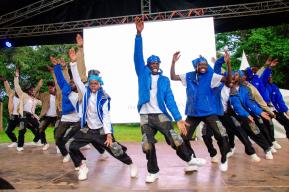Under the Multi-Year Resilience Programme, funded by Education Cannot Wait, UNESCO has been working with teachers and schools in Palestine to make learning fun for children. Find out how the project has been making an impact at one school in Beitunia.
It’s a crisp January morning in Beitunia, located towards the outskirts of Ramallah in the West Bank. Children are gathered in the playground of Al Jenan Co-Ed Basic Education School, excited to go inside and start their Arabic and math lessons.
However, these are not just traditional Arabic and math lessons – much of the teaching and learning in this school happens through fun activities.
This school is one of 190 schools in Palestine where teachers have been trained in delivering lessons through sport, music, storytelling and drama in order to actively engage students, overcome learning gaps and also act as a form of psychosocial support in often challenging circumstances.
Inside the school, shouts of ‘Miss Miss Miss’ reverberate around the classrooms as the students try their best to catch the attention of the teacher and be picked to lead the activity or answer questions. The children are engaged, enthusiastic, and cheer each other on from their desks.
In Arabic class, the students weave through traffic cones in the centre of the room before sticking letters in the correct position between the huge cut-out bees on the board. Next door in math class, children are taking their instructions from the sock puppet at the end of their teacher Jumana’s hand, asking them to add up numbers based on what is written on the cartoon cut-out chickens on the board.
Learning through fun activities is more learner-centered, offering students better interaction possibilities inside the classroom. Students are encouraged to work together and communicate, rather than just listening to the teacher talk.
Tuline, who is 6 years old, enjoys her lessons so much that she shares what she has learned with her siblings.
I love learning while playing! It’s much better than regular classes. I teach my brothers and sisters now too at home, and I’m always excited to come to school the next day.
Using the approach of fun activities is one that the teachers also find very beneficial, for both them and their students. Staff and management are impressed with the difference that the project has made in the school, and they are determined to maintain and expand it to other subjects.
Arabic teacher Jumana can see the positive impact that learning through fun activities is having on her students.
I am very happy to deliver teaching and learning using fun activities - it’s the best way to engage students in class. The students, even those who have difficulties with learning, are enjoying the lessons! Parents are happy to send their children to additional classes during school vacation too because they know they are both learning and having fun!
Anwar, Deputy Principal, agrees and is determined to maintain momentum.
We want to try and maintain this approach in our daily teaching and learning – we are all impressed at how actively students engage in the classroom now!
Parents are also impressed with the change they notice in their children since they started learning in this way.
We’re glad that our children are taking part in these activities. Now they come home every day and are delighted to share what they have learned in Arabic and math. They are also spending less time on electronic devices, whereas they used to have more screen time. We can sense a change in how excited they are to get up early and go to school.
The Multi-Year Resilience Program (MYRP)
Children in Palestine can face challenges in accessing safe, quality and inclusive education as a result of the ongoing political situation and occupation. The COVID-19 pandemic also exacerbated difficulties for many school goers, as school closures led to learning losses.
The Multi-Year Resilience Program, implemented by multiple agencies in Palestine including UNESCO, and funded by Education Cannot Wait, has been helping to ensure that children in some of the most difficult circumstances can still access safe, quality and inclusive education.
Learn more about the Multi-Year Resilience Programme in Palestine here.









